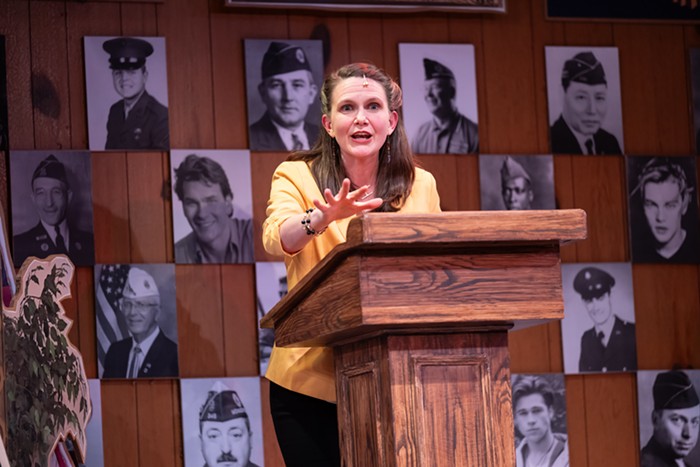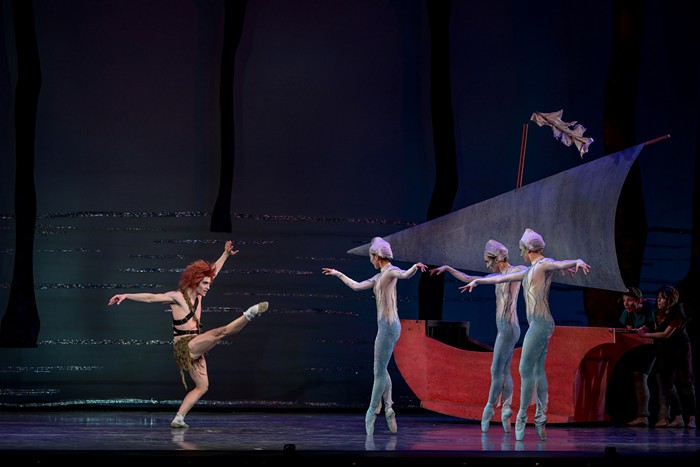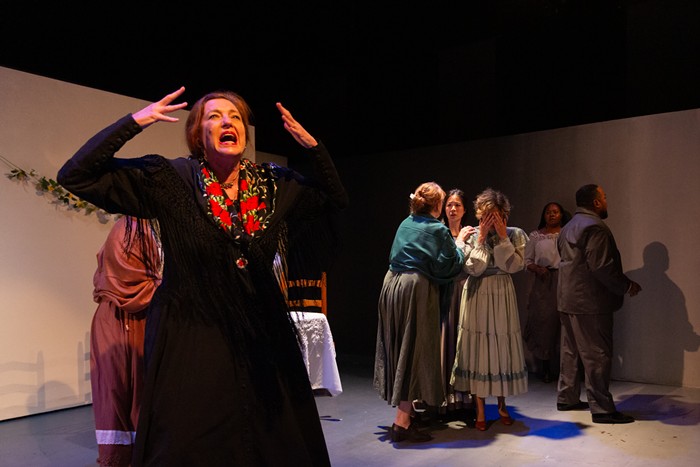Long time Portland pro Ted Roisum, for example, tries to distance himself from the text by speaking so softly that he can barely be heard even within the sardine can digs of Stark Raving. Roisum plays a half-blind singer summoned to a televangelist's TV show. Meanwhile, his youthful self--a soldier assigned to Los Alamos where he befriends a seemingly tubercular and unhistorically guilt-ridden Robert Oppenheimer (Scott Coopwood)--is embodied by the unconvincing Sean Parker, whose physical mannerisms suggest a kid who has just discovered the joys of the trampoline.
If most of the actors are sullen, director Jane Unger, of the Profile Theatre Project, is simply helpless in the face of the play's poverty of ideas and her recalcitrant players. She attempts to make up for these problems by devising (with the help of designer Rob Morgan) an elaborate playing field. The set is a couple of connected narrow ramps that segregate different places, different times. Sadly, it doesn't distract us from the mediocrity of the play itself. And the set creates further difficulties. It's unclear whether Unger is honoring the stage directions, or came up with the idea of having many characters remain on stage in shadows while different scenes unfold nearby. Though this may give the impression of a lot going on inside a play, what it can't disguise is that the text is inert.
Congdon's play is rich in "irony." So I suppose it's "ironical" that Oppenheimer should have a bad cough since he's the guy who invented the bomb that would kill thousands. And it's ironical that an adult victim of the bomb, blinded in one eye because there was a crack in his goggles (is this even medically plausible?), should "save" a pregnant woman (Deanna Wells) on a televangelist's program. As an adult, Roisum's character Roy Layton lives in a "typical" American house, with a fussy, reality-denying wife (Jean Miller). This ironic home occupies a cramped little space on stage, where a silent and symbolic child wanders around ironically; perhaps he is looking for his real home, which is Who's Afraid of Virginia Woolf? Speaking of kids, children should be banned from the stage, or at least Portland stages; rarely are they "in the moment," and therefore inevitably distract the spectator from the text, which is after all the pretext for our presence in the theater.
As the Profile Theater's phone greeting warns us, there is brief nudity in the play. That happens when the pregnant woman's soldier husband (Jason Maniccia) gets out of bed. The penis is the most unironic thing in the world, but in this context you have to wonder what new ironical point is being made. What isn't ironic is that the Profile Theater Project, which withholds its ticket prices from the consumer until the last possible moment, seems to be extremely well-funded. You are handed a nicely produced program as you enter. On the last page is a list of all the people and institutions that have donated money. It's a simple matter to roughly calculate the company's nest egg. On the back page is an announcement of next season's project, which is dedicated to Arthur Miller. Clearly, Jane Unger and Co. favor plays and playwrights who are obvious, super-serious, tackle big ideas and social problems and trade in irony. It's not irony, though, just sad, that such a well-supported theater company should have such middlebrow, mediocre taste in plays. This last page asks the reader, ungrammatically, "Should we do All My Sons? or After the Fall?" I doubt if they would take my advice on the matter.
No Mercy is followed by the staged reading of another one-act by Congdon on similar themes, featuring Albert Einstein and Leo Szilard; it is a pleasure from which this reviewer did not avail himself.


















